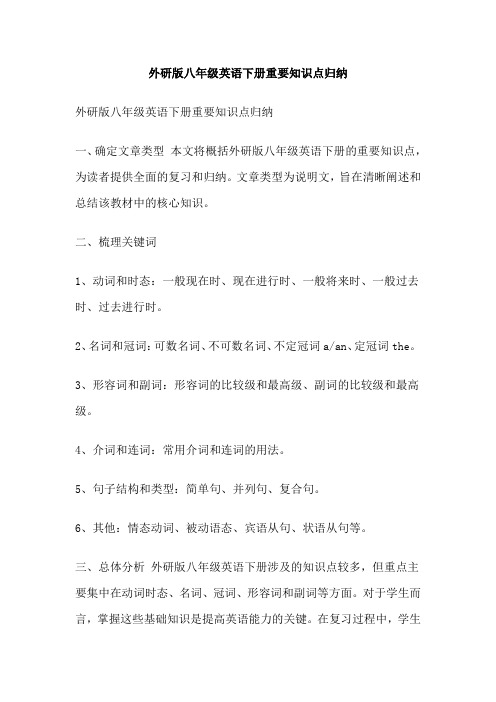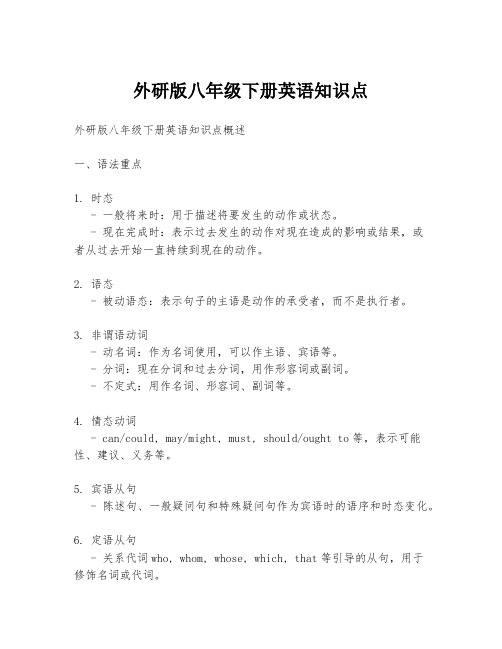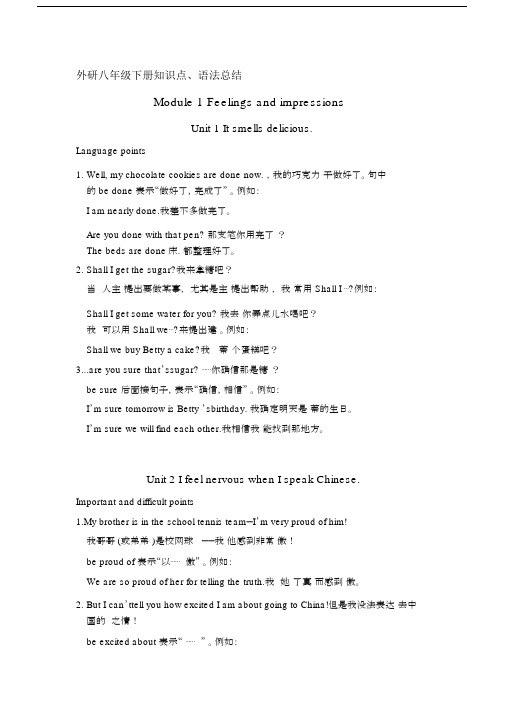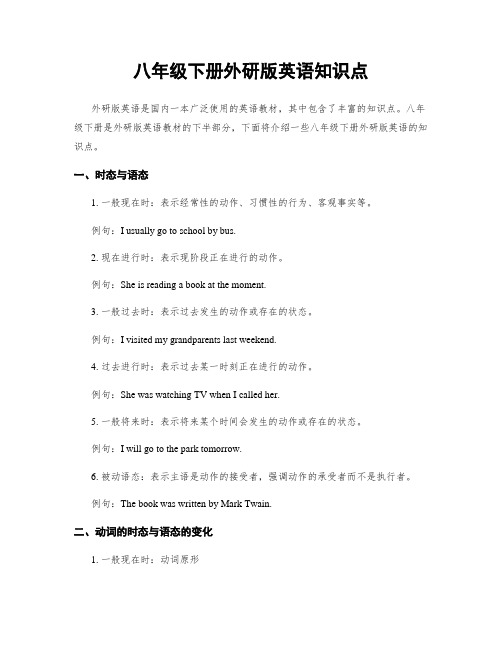八年级英语下册知识讲义-语法讲解(现在完成时和其他时态的区分)-外研版
Module 2课文知识点总结(含语法)-外研版八年级下册英语

2021~2022学年新课标外研版初中英语学习讲义八年级下学期Module 2课文知识点总结笔记Module 2 Experiences语法: 现在完成时(一)一、用法:(1)表示以前某个时间已经发生的动作或做过的事情对现在有影响 Eg: I have seen the film. 我已经看过这部电影了。
(强调电影的内容已经知道)(2)表示到目前为止已经完成的事。
Eg: My sister has learnt English for 3 years. 我的妹妹已经学英语三年了。
二、构成:主语 + have/ has + 动词过去分词三、各种句式肯定句:主语 + have/ has + 过去分词 + 其它Eg: I have watched the match.否定句:主语 + have/ has not + 过去分词 + 其它Eg: I haven’t watched the match.一般疑问句:Have/ Has + 主语 + 过去分词 + 其它肯定回答: Yes, 主语 + have/ has.否定回答: No, 主语 + haven’t/ hasn’t.Eg: Have you watched the match ?Yes, I have./ No, I haven’t.四、动词过去分词的构成:规则动词变化1.大多数动词后直接加ed:work → worked; cook → cooked2.以e结尾的动词加d:lived → lived; like→ liked3.以辅音加y结尾将y变成i加ed:try → tried; study → studied4.在重读闭音节中,双写结尾加ed: stop → stopped; plan → planned5.不规则变化:见教材126页表格1.experience ( Cn.) 经历Eg: Please tell me about your experience in Africa.experience (Un) 经验Eg: Miss Li has 30 years’ teaching exper ience.2.enter a competition 参加比赛enter = take part in 参加;进入3.what kind of …什么种类kind (n.) 种类 all kinds of 各种各样的; a kind of 一种; different kinds of 不同种类的;kind of 有点;kind (adj.) 善良的 Eg: He is a kind boy.4.speaking competition 演讲比赛5.improve speaking 提高口语6.maybe (adv.) “也许;大概”may be 情态动词 + Be动词“也许是;可能是”Eg: She may be angry.= Maybe she is angry.7.win a prize 获奖beat “打败”后接对手或团队等win “赢得”后接比赛、奖品等8.the first prize 一等奖9.dream (n.) 梦寐以求的人或事Eg: That’s my dream s chool.dream “梦;梦想”Eg: My dream is to be a pilot.(v.) 梦到;梦想dream of/ about …“梦见… ”后接名词、代词或动名词Eg: I dream of/ about flying in space.10.ever (adv.) “曾经;从未”用于现在完成时的一般疑问句中,加强语气“Have/ Has sb. ever + 过去分词 + 其它?”用于询问某人是否做过某事11.before(adv.) “以前”与现在完成时连用,也可用于一般过去时中,位于句末。
初中英语外研版八年级下册M5U3知识讲解

八年级英语下册M5U3知识讲解【语法】语法:一般现在时,一般过去时与现在完成时的区别(一)概念不同一般现在时表示主语经常性和习惯性的动作或存在的状态,也表示说话者的能力及自然现象。
一般过去时表示过去某个时间发生的事,存在的状态或经常发生的动作,说话的侧重点只在于陈述一件过去的事情,不强调对“现在”产生的影响。
现在完成时表示动作发生在过去,对现在造成影响或产生了结果。
(二)构成方式不同一般现在时:主语 + be动词/实义动词 + 其它一般过去时:主语 + 动词过去式 + 其它现在完成时:主语 + have/has + 动词过去分词 + 其它(三)时间状语不同一般现在时:always, usually, often, sometimes, never, every day, on Sundays, in the morning/ afternoon/ evening等一般过去时:yesterday, last week, two years ago, just now, in 2002等现在完成时:just, already, ever, never, these days, this week, since…, for…等连用Eg: We play football every afternoon.每天下午我们踢球。
Did you see the film last night?你昨晚看电影了吗?He has lived in Beijing for 8 years.他已经住在北京八年了。
【知识点】1.mind (动词) “介意;反对”后接名词、动词ing、that从句mind (名词) “思想;头脑;智力”Eg: I don’t mind a joke, but this is going too far.我不介意开玩笑,但这太过分了。
Do you mind if I open the window?= Do you mind my opening the window?你介意我开窗户吗?She can’t make up her mind.她不能下定决心。
外研版八年级英语下册重要知识点归纳

外研版八年级英语下册重要知识点归纳外研版八年级英语下册重要知识点归纳一、确定文章类型本文将概括外研版八年级英语下册的重要知识点,为读者提供全面的复习和归纳。
文章类型为说明文,旨在清晰阐述和总结该教材中的核心知识。
二、梳理关键词1、动词和时态:一般现在时、现在进行时、一般将来时、一般过去时、过去进行时。
2、名词和冠词:可数名词、不可数名词、不定冠词a/an、定冠词the。
3、形容词和副词:形容词的比较级和最高级、副词的比较级和最高级。
4、介词和连词:常用介词和连词的用法。
5、句子结构和类型:简单句、并列句、复合句。
6、其他:情态动词、被动语态、宾语从句、状语从句等。
三、总体分析外研版八年级英语下册涉及的知识点较多,但重点主要集中在动词时态、名词、冠词、形容词和副词等方面。
对于学生而言,掌握这些基础知识是提高英语能力的关键。
在复习过程中,学生应结合教材中的例句和练习题,深入理解各个知识点的用法和意义。
四、具体展开1、动词和时态:熟练掌握一般现在时(表示习惯或经常发生的动作)、现在进行时(表示正在进行的动作)、一般将来时(表示将来要发生的动作)、一般过去时(表示过去发生的动作)和过去进行时(表示过去正在进行的动作)。
注意动词的形式变化,如第三人称单数、过去分词等。
2、名词和冠词:理解可数名词和不可数名词的区别,掌握不定冠词a/an和定冠词the的用法。
注意名词的数与量的搭配,如a piece of paper, two pieces of paper等。
3、形容词和副词:掌握形容词的比较级和最高级(如big-bigger-biggest),了解副词的比较级和最高级(如fast-faster-fastest)的构成和用法。
同时,要学会使用形容词和副词来描述事物和动作,如She sings beautifully. The car drives quickly.4、介词和连词:掌握常用介词的用法,如in, on, at, for等,以及常用连词的用法,如and, but, or等。
外研版八年级下册英语知识点

外研版八年级下册英语知识点外研版八年级下册英语知识点概述一、语法重点1. 时态- 一般将来时:用于描述将要发生的动作或状态。
- 现在完成时:表示过去发生的动作对现在造成的影响或结果,或者从过去开始一直持续到现在的动作。
2. 语态- 被动语态:表示句子的主语是动作的承受者,而不是执行者。
3. 非谓语动词- 动名词:作为名词使用,可以作主语、宾语等。
- 分词:现在分词和过去分词,用作形容词或副词。
- 不定式:用作名词、形容词、副词等。
4. 情态动词- can/could, may/might, must, should/ought to等,表示可能性、建议、义务等。
5. 宾语从句- 陈述句、一般疑问句和特殊疑问句作为宾语时的语序和时态变化。
6. 定语从句- 关系代词who, whom, whose, which, that等引导的从句,用于修饰名词或代词。
7. 状语从句- 时间、原因、条件、结果、让步等状语从句的使用。
二、词汇与短语1. 常用词汇- 描述人物特征的形容词,如kind, honest, creative等。
- 描述日常活动的动词短语,如clean up, take out, give up等。
- 与学校生活相关的词汇,如homework, project, presentation 等。
2. 话题相关短语- 旅游与交通:book a ticket, take a taxi, sightseeing等。
- 健康与饮食:eat healthily, do exercise, balanced diet等。
- 环境保护:recycle, save energy, global warming等。
三、阅读理解1. 抓住文章主旨- 通过阅读标题、首段和结尾段来把握文章大意。
2. 理解细节信息- 通过关键词定位法,找到文章中的具体信息。
3. 推理判断- 根据文章内容进行逻辑推理,理解作者的隐含意义。
外研版八年级下册语法讲解—完成时

星火教育一对一辅导教案教学课题一般现在时、一般过去时和现在完成时辨析+ have + not +过去分词+ has + not +过去分词现在完成时的特殊疑问句一、用法1. 表示开始于过去的动作最近刚结束现在完成时表示开始于过去的动作刚刚结束时,常和以下时间状语连用:just 刚刚, already 已经, ever 曾经, recently 最近, never 从未, yet 还,仍然(否定句);已经(疑问句).例句: Have you ever worked on a farm?I have already finished my homework.He has just e.2. 继续表示过去开始,持续到现在,而且还可能继续下去的动作或状态。
常和表示一段时间的状语连用。
since +时间点:从……开始表示从过去到现在之间曾经经历过的事情常和以下的词连用:often 经常, never 从不, ever 曾经, once 一次twice 两次,since 自从, before 之前.二、能与现在完成时连用词语很多,如副词j ust, already, yet, before, ever, recently 等,但下面是一些典型而且重要的例子:到现在为止这工作还算容易。
__________________________________________到现在为止我还没有听到他一点音信。
__________________________________(5) It’s the first time that…(第一次…):1.现在完成时与一般过去时的区别I have washed the car. (It is clean.)I washed the car yesterday.现在完成时强调的是在时间上与现在的联系,因此它不能和表示确定的过去时间状语连用,如ago(以前)、yesterday(昨日)、last week(上周)、 three years ago(三年前)、i n 2001(2001 年)、以及以 when 为首的疑问句等。
(完整word版)外研八年级下册知识点、语法总结.docx

外研八年级下册知识点、语法总结Module 1 Feelings and impressionsUnit 1 It smells delicious.Language points1.Well, my chocolate cookies are done now. ,我的巧克力干做好了。
句中的 be done 表示“做好了,完成了”。
例如:I am nearly done.我差不多做完了。
Are you done with that pen? 那支笔你用完了?The beds are done床.都整理好了。
2.Shall I get the sugar?我来拿糖吧?当人主提出要做某事,尤其是主提出帮助,我常用 Shall I ⋯?例如:Shall I get some water for you? 我去你弄点儿水喝吧?我可以用 Shall we⋯?来提出建。
例如:Shall we buy Betty a cake?我蒂个蛋糕吧?3...are you sure that’ssugar? ⋯⋯你确信那是糖?be sure 后面接句子,表示“确信,相信”。
例如:I’m sure tomorrow is Betty ’sbirthday. 我确定明天是蒂的生日。
I’m sure we will find each other.我相信我能找到那地方。
Unit 2 I feel nervous when I speak Chinese.Important and difficult points1.My brother is in the school tennis team—I’m very proud of him!我哥哥 (或弟弟 )是校网球——我他感到非常傲!be proud of 表示“以⋯⋯傲”。
例如:We are so proud of her for telling the truth.我她了真而感到傲。
外研版八年级下册语法

外研版八年级下册语法外研版八年级下册语法:让大家的英语更上一层楼在英语学习中,语法是不可或缺的一部分。
它不仅涉及到我们的语言表达是否准确,还影响着我们与他人的交流是否顺畅。
对于使用外研版八年级下册教材的学生们来说,掌握教材中的语法知识更是至关重要的。
本文将针对教材中的主要语法内容进行解读和指导,帮助同学们更好地掌握英语语法。
一、动词时态和语态动词时态和语态是英语语法中的基础内容,也是我们在日常生活中经常使用的语法知识。
在八年级下册的教材中,我们将学习到一般现在时、现在进行时、一般过去时和过去进行时等主要时态。
同时,我们还将学习到主动语态和被动语态的概念和应用。
为了更好地掌握这些内容,建议同学们在学习过程中做好以下几点:1、理解每种时态和语态的含义和用法,切勿死记硬背。
2、通过大量的阅读和写作练习,熟悉各种时态和语态的使用场景。
3、关注教材中的例句,分析不同时态和语态之间的区别,加深理解。
二、情态动词情态动词是表达情态意义的动词,如can、may、must等。
在八年级下册的教材中,我们将学习到一些常见的情态动词及其用法。
为了更好地掌握情态动词,建议同学们在学习过程中注意以下几点:1、熟记常见的情态动词及其意义,如can表示“能够”,may表示“可以”等。
2、学会区分不同类型的情态动词,如表示可能性、能力、义务等的情态动词。
3、在日常会话中尝试使用情态动词,练习表达自己的意愿和态度。
三、形容词和副词形容词和副词是英语中用于修饰名词和动词的词语。
在八年级下册的教材中,我们将学习到形容词和副词的基本用法、比较级和最高级等知识。
为了更好地掌握形容词和副词,建议同学们在学习过程中注意以下几点:1、掌握形容词和副词的基本用法,如形容词用于修饰名词,副词用于修饰动词、形容词和整个句子等。
2、学会使用比较级和最高级,如通过使用“-er”和“-est”的形式来表示比较级和最高级。
3、在阅读和写作中注意观察形容词和副词的使用,积累相关的表达方式。
八年级下册外研版英语知识点

八年级下册外研版英语知识点外研版英语是国内一本广泛使用的英语教材,其中包含了丰富的知识点。
八年级下册是外研版英语教材的下半部分,下面将介绍一些八年级下册外研版英语的知识点。
一、时态与语态1. 一般现在时:表示经常性的动作、习惯性的行为、客观事实等。
例句:I usually go to school by bus.2. 现在进行时:表示现阶段正在进行的动作。
例句:She is reading a book at the moment.3. 一般过去时:表示过去发生的动作或存在的状态。
例句:I visited my grandparents last weekend.4. 过去进行时:表示过去某一时刻正在进行的动作。
例句:She was watching TV when I called her.5. 一般将来时:表示将来某个时间会发生的动作或存在的状态。
例句:I will go to the park tomorrow.6. 被动语态:表示主语是动作的接受者,强调动作的承受者而不是执行者。
例句:The book was written by Mark Twain.二、动词的时态与语态的变化1. 一般现在时:动词原形例句:They often play basketball in the afternoon.2. 现在进行时:be动词的形式+动词的ing形式例句:She is watching TV now.3. 一般过去时:动词过去式例句:He cooked dinner yesterday.4. 过去进行时:was/were+动词的ing形式例句:They were playing football when it started raining.5. 一般将来时:will+动词原形例句:We will visit the museum tomorrow.6. 被动语态:be动词的形式+动词的过去分词形式例句:The house was built last year.三、形容词与副词的比较级和最高级1. 比较级:比较两个人或物的程度、性质等,形容词+er或more+形容词例句:She is taller than her sister. He is more intelligent than his classmates.2. 最高级:比较三个或三个以上的人或物的程度、性质等,形容词+est或most+形容词例句:He is the tallest boy in the class. She is the most beautiful girl in the school.四、连词的用法1. 并列连词:连接两个并列的词、词组、句子等例句:I like playing basketball and swimming.2. 时间连词:表示时间的顺序、先后例句:First, I brush my teeth. Then, I have breakfast.3. 原因连词:表示原因、目的例句:I study hard because I want to get good grades.4. 结果连词:表示结果、因果关系例句:The weather is hot, so we go swimming.5. 条件连词:表示条件、假设例句:If it rains tomorrow, we will stay at home.6. 让步连词:表示让步、虽然例句:Although it's cold, I still go for a run.以上是八年级下册外研版英语的一些知识点,包括时态与语态、动词的时态与语态的变化、形容词与副词的比较级和最高级、连词的用法等。
- 1、下载文档前请自行甄别文档内容的完整性,平台不提供额外的编辑、内容补充、找答案等附加服务。
- 2、"仅部分预览"的文档,不可在线预览部分如存在完整性等问题,可反馈申请退款(可完整预览的文档不适用该条件!)。
- 3、如文档侵犯您的权益,请联系客服反馈,我们会尽快为您处理(人工客服工作时间:9:00-18:30)。
知识梳理They have been to many interesting places.他们去过很多有意思的地方。
我们在学习了现在完成时的相关知识后,最迫切想要掌握的就是对于已经学过的不同时态的一个区分。
在这里将一般过去时和现在完成时进行一个系统地区分还是很有必要的。
其余时态因为本身有着各自的侧重点,和现在完成时牵扯的关系不多,在这里我们只点到为止。
一般现在时只强调当前习惯性的动作,一般将来时的落脚点在将来。
现在进行时和过去进行时则更多强调某一时刻“正在发生”的动作。
一般过去时的主要侧重点在于描述“过去发生的动作”。
在时间上多强调“点”。
而现在完成时则主要强调动作的延续,在时间上多强调“段”。
I saw this film yesterday. 我昨天看了这部电影。
I have seen this film. 我已经看过这部电影。
这两句话中,前一句只强调昨天看电影的事实,而后一句则强调“已经看过”,说明以后可能不想再看。
1. Jay is my favourite star and I _________ to his concerts many times.A. wentB. goC. will goD. have been2. Sally's sister __________ in Beijing for more than 3 years. She loves living in Beijing.A. studiedB. have studiedC. has studiedD. is studying3. —Have you ever entered a competition?—No, never. But I ________ about it for a long time.A. dreamedB. dreamC. have dreamedD. will dream4. I have __________ visited the USA, but I'm sure some day I will.A. everB. neverC. alwaysD. already5. I don't want to see the film because I __________ it already.A. sawB. have seenC. seeD. will see答案:DCCBB思路分析:时态的复习。
【即学即练】1. We __________ our little dog in the garden, so we are very happy now.A. have foundB. foundC. findD. will find2. Lucy is in London now. She ________ several emails to us recently.A. sentB. sendsC. will sendD. has sent3. My aunt _______ in Beijing. I'm going to see her.A. arrivedB. has arrivedC. arrivesD. will arrive4. —Have the students finished their homework ___________?—Yes, they have.A. justB. alreadyC. yetD. ever5. She isn't in the classroom now because she _________ the library.A. has been toB. have been toC. have gone toD. has gone to6. Tom and Tony ________ the interesting story-book several times.A. readB. are readingC. readsD. have read7. We ________ that our spacecraft has landed on Mars.A. were hearingB. heardC. have heardD. will heard8. Mike and his parents have ________ gone to Hong Kong. They'll return in a week.A. yetB. alreadyC. neverD. ever9. Lots of astronauts _________ to the space station. They found it very interesting.A. has beenB. have beenC. have goneD. has gone10. The students _________ their summer holiday plans already.A. makeB. madeC. have madeD. will made11. Scientists have _________ discovered many other galaxies in the universe.A. yetB. alreadyC. neverD. ever12. Daming _________ his homework yet, so he can't play with his friends.A. doesn't finishB. won't finishC. hasn't finishedD. didn't finish答案:ADBCD DCBBC BC思路分析:考查时态和其他重点知识点。
同步练习一、完成句子。
1. 我参加过演讲比赛。
_______________________ a speech competition.2. —你的笔友以前来过中国吗?—没有。
—_____________________________ China before?—No, she hasn't.3. 我妈妈曾经看过这部电影。
___________________________ the film.4. —你曾想环游世界吗?—是的。
—_____________________________ around the world?—Yes , I have.5. 我们英语老师坐飞机去过很多地方。
Our English teacher ____________________________.二、阅读理解。
(A)Are you aged between 14 and 19 years old? Do you care about your local environment? Would you like to help make the area you live in better, cleaner, safer and more friendly?If your answers are “yes”, “yes” and “yes”, then read on! You may be surprised to hear that you can actually get money for improving your local community.The “Big Lottery”is giving money to groups of teenagers who want to become active citizens. We have £80,000 to distribute. We’re looking for young people to take part in schemes and projects near to where they live.Here are a few easy things you could do to get started.Meeting the neighboursEverybody needs good neighbours. Knock on people’s doors and find out what they would like to make your area better. Set a date for a meeting and then make some plans together. If you don’t want to go round to their houses, then you could always put a note through their doors.Neighbourhood watchNeighbourhood watch schemes are very popular in the UK. If you go away on holiday and leave your house, it’s very nice to know that a neighbour is keeping an eye on it. It’s a good way to make the area you live in safer. You could set one up easily and quickly.Lending a handThere are often elderly people living in the neighbourhood who may not be able to do the things that you can. Offer to do their shopping once a week, look after their garden for them or maybe walk their dog!No litteringNobody likes picking up other people’s rubbish, but a clean street can make all the difference. Take it in turns to go out once or twice a week and see what you can find something valuable.RecyclingNearly two-thirds of your rubbish can be recycled. Some areas already provide places for people to recycle bottles, tins, plastic and paper. Find out if this is done in your neighborhood. If it’s not, do something about it.So, go on… Help make your neighborhood ‘streets ahead’. Just tell us what kind of project you want to become involved in. Then we’ll send you more details. Take positive action and help make your neighborhood a better place to live in!1. The underlined word “distribute” means __________.A. give outB. get awayC. check outD. pay back2. From the passage we can know ___________.A. all the teenagers in the neighbourhood are needed to join the projectB. we need to watch our neighbour carefully to make our houses safeC. we can discuss plans with our neighbours to make our area betterD. we should shake our hands with old people in the neighbourhood3. The author advised the teenagers to take part in the project in order to ____________.A. make the area they live in safer and more friendlyB. improve the environment of the local communityC. help the old people and teenagers in the communityD. help to pick the rubbish in the street and recycle it(B)Riding in school buses in the early morning, then sitting in poorly lit classrooms, are the main reasons students have trouble getting to sleep at night, according to new research.Teenagers, like everyone else, need bright light in the morning to allow their circadian rhythms(生理节奏)to get into step with nature’s cycles of day and night.If they don’t get blue light in the morning, they get to sleep an average of six minutes later at night, until their bodies are completely out of sync(同步)with the school day, researchers from Rensselaer Polytechnic Institute in New York said last month.The finding was made by fitting goggles that block blue light from the sun to a group and of students. The researchers discovered that their circadian rhythms were greatly affected.Parents and teachers have been complaining in recent years that teens stay up too late at night, then fall asleep in class the next morning and do poorly in school. The new findings provide a possible explanation for the problem.At the root of the research is the circadian rhythm, the body’s natural sleep waking cycle. Even though the Earth makes a full rotation(旋转)in 24 hours, the body’s circadian cycle is about 24 hours and six minutes long. The cycle is mediated(调节)by a chemical called melatonin(褪黑激素). The body starts to produce it about two hours before it is time to sleep and, in the absence of blue light, the body produces about six minutes later each day.In the study, the researchers studied 11 students at Smith Middle School in New York, which was designed so that a lot of sunlight reaches classrooms. On a Friday night, the researchers measured what time the 11 students’ bodies began releasing melatonin. On Monday morning, the students were sent to school with orange goggles that blocked most blue light from their eyes to mimic(模拟)the conditions found in many – if not most – schools. By the end of the week, the students were releasing melatonin 30 minutes later in the evening – an average of six minutes a day – and going to sleep later.“This is our first field study,” said lead author Mariana G. Figueiro. He said they would like to repeat it in larger studies and for longer periods of time. If the findings are repeated, a variety of solutions are available. Ideally, new schools would be built to allow more natural sunlight into the classrooms. Students could also be exposed to more sunlight outside.1. According to the findings related in this article, many teenagers stay up late because ______.A. they lack melatonin in their bodiesB. they have a lot of homework to doC. they get up so early to catch the busD. their circadian rhythms are in disorder2. What does the underlined sentence in the last paragraph mean?A. If we repeat the findings, many solutions to the problems will be used.B. If the findings appear again, different solutions could be found easily.C. If the findings proved to be correct, all kind of solutions could be found.D. If we repeat the studies, we can find many ways to solve the problems.3. What can we infer from the passage that ______.A. few schools have small windows and the classrooms are poorly litB. the sunlight is the only thing that can affect our circadian rhythmsC. the fitting goggles can help the teenagers to solve the sleeping problemsD. students who get more blue light are less likely to have sleeping problems4. The passage is mainly about ________________.A. the causes of teenagers’ disordered circadian rhythmsB. the new research on the teenagers’ sleeping problemsC. the ways of improving the condition of the classroomsD. the study on helping the teenagers not fall asleep in class答案一、1. I have entered2. Has your pen friend ever come to3. My mother has ever seen4. Have you ever wanted to travel5. has been to many places by plane二、(A)ACB(B)DCDB。
